america
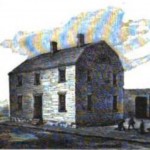 These days there are so many public schools in the United States, that they have become something we give little thought to. That was not always the case, however. As people moved West to populate this great nation, many mothers had to homeschool their children. Eventually, schools began to spring up across the prairie, but what about the schools back East. This nation didn’t always have schools. Things had to be established first. And considering the fact that America was discovered in 1492, it would seem to me that the schools were a bit behind the times. The first public school in the United States, was established on this day, April 23, 1635, in Boston, Massachusetts. The school was called the Boston Latin School. At the time the school was formed, English was not the only language spoken in the United States, so learning Latin, which was considered to be the root of European language, was also a priority, as it was with grammar schools in
These days there are so many public schools in the United States, that they have become something we give little thought to. That was not always the case, however. As people moved West to populate this great nation, many mothers had to homeschool their children. Eventually, schools began to spring up across the prairie, but what about the schools back East. This nation didn’t always have schools. Things had to be established first. And considering the fact that America was discovered in 1492, it would seem to me that the schools were a bit behind the times. The first public school in the United States, was established on this day, April 23, 1635, in Boston, Massachusetts. The school was called the Boston Latin School. At the time the school was formed, English was not the only language spoken in the United States, so learning Latin, which was considered to be the root of European language, was also a priority, as it was with grammar schools in 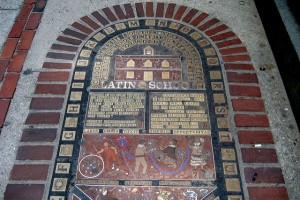 England. Seventeenth-century schoolboys throughout Europe, Catholic or Protestant, learned Latin, and which explains the focus of Boston Latin.
England. Seventeenth-century schoolboys throughout Europe, Catholic or Protestant, learned Latin, and which explains the focus of Boston Latin.
One of the main reasons for education, as far as the Puritans were concerned, was to be able to read the Bible. One of the main reasons for the pilgrimage to the new world was religious freedom, and they felt like it was essential that their students be schooled in the important languages, so they could read the Bible and other important books for themselves. Boston Latin School has prided itself on the number of its students who attended Harvard, or some of the other prestigious four year college.
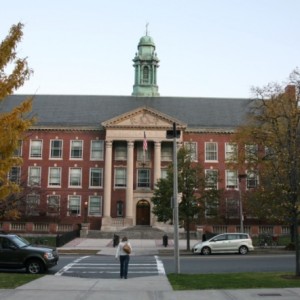 When I think of the first school in the United States, and the history thereof, I think of my Aunt Bertha Schumacher Hallgren. She mentioned in her journal that in writing a family history, the author should mention things that are interesting about the times the people in the family lived in. She also had a type of love-hate relationship with school. As a young girl, all she really wanted to do was to stay at home with her mother, but she also understood the importance of a good education, for without it she would not have been able to get the jobs she was able to get, which were good jobs, especially for a woman at that time in history. Whether we enjoy school or not, it is a gateway to almost every opportunity there is, and in the United States, it started with Boston Latin School.
When I think of the first school in the United States, and the history thereof, I think of my Aunt Bertha Schumacher Hallgren. She mentioned in her journal that in writing a family history, the author should mention things that are interesting about the times the people in the family lived in. She also had a type of love-hate relationship with school. As a young girl, all she really wanted to do was to stay at home with her mother, but she also understood the importance of a good education, for without it she would not have been able to get the jobs she was able to get, which were good jobs, especially for a woman at that time in history. Whether we enjoy school or not, it is a gateway to almost every opportunity there is, and in the United States, it started with Boston Latin School.
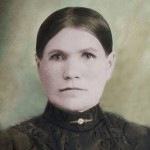 Things were quite different in the 1800s, as most of you know, but sometimes I wonder if we really understand how different they were. In about 1876 or so, my great grandmother, Henriette Schumacher, a girl of about 16 years, was sent by her widowed mother, with her sister to America. Her sister’s husband wanted to immigrate there, and since they had two little daughters, and Great Grandma’s mother was worried about her daughter going so far without help, she decided that since Henriette was not married she should go too. For their mother, there seemed to be safety in numbers, so it had to be better to send two girls instead of just one. I really can’t imagine the heartache she must have felt at that time. When my own daughter, Amy Royce moved to Washington state, I thought my heart would break…and yet I knew I would see her again, and that communication for us would be fairly easy. For my 2nd great grandmother, things were different. She didn’t know if she would see her daughters again, and I have no way to confirm that she did.
Things were quite different in the 1800s, as most of you know, but sometimes I wonder if we really understand how different they were. In about 1876 or so, my great grandmother, Henriette Schumacher, a girl of about 16 years, was sent by her widowed mother, with her sister to America. Her sister’s husband wanted to immigrate there, and since they had two little daughters, and Great Grandma’s mother was worried about her daughter going so far without help, she decided that since Henriette was not married she should go too. For their mother, there seemed to be safety in numbers, so it had to be better to send two girls instead of just one. I really can’t imagine the heartache she must have felt at that time. When my own daughter, Amy Royce moved to Washington state, I thought my heart would break…and yet I knew I would see her again, and that communication for us would be fairly easy. For my 2nd great grandmother, things were different. She didn’t know if she would see her daughters again, and I have no way to confirm that she did.
Still, many people were leaving the old country, in search of a dream life somewhere else. In that way, not much has changed at all. People still move from place to place, and sometimes country to country in search of some exciting new dream life. Some find what they are looking for, and others find out that what they were searching for was right there in front of them all along, so they return to their home. For my great grandmother, there didn’t seem to be much of a dream life waiting for her. She had a boyfriend back home, but things weren’t serous I suppose, because he didn’t follow her, and they never married. I think that for Great Grandma, Germany was comfortable. It was her home, and all she really knew. She didn’t have the wanderlust that her brother-in-law had. She couldn’t see that a life in America would be any better than the one she had in Germany, close to her family and friends. Nevertheless, go she must, so she said goodbye to all she knew, and headed off with her sister’s family to America.
In the end, she would find that her destiny was in America. It was there that she met my great grandfather, Carl Schumacher, who had immigrated a few years earlier. Their chance meeting when he stepped in for a baptismal sponsor who was unable to attend the baptism of Henriette’s sister’s daughter, brought Carl he 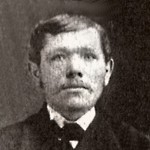 woman he would fall so completely in love with, that they would marry just a year later. I’m sure at that point, Henriette thought back to her prior boyfriend, and decided that their romance was a silly schoolgirl crush. Whoever he was, he could never have measured up to the man Carl was. Henriette wasn’t the same either. She was a world traveler now. She had lived in a wild new country. She had left home, grown up quickly, and had a degree of independence that her old beau would not have understood. Her world was different…things were different…she was different. He would never have been her choice now. Sometimes that is just how it goes. Our lives take turns that we didn’t plan on, and suddenly things are different. Then we have to live our life in the new reality that we live in. I’m sure that is how her mother felt too.
woman he would fall so completely in love with, that they would marry just a year later. I’m sure at that point, Henriette thought back to her prior boyfriend, and decided that their romance was a silly schoolgirl crush. Whoever he was, he could never have measured up to the man Carl was. Henriette wasn’t the same either. She was a world traveler now. She had lived in a wild new country. She had left home, grown up quickly, and had a degree of independence that her old beau would not have understood. Her world was different…things were different…she was different. He would never have been her choice now. Sometimes that is just how it goes. Our lives take turns that we didn’t plan on, and suddenly things are different. Then we have to live our life in the new reality that we live in. I’m sure that is how her mother felt too.
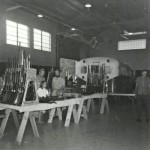
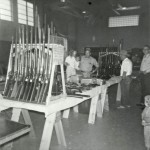 For as long as I can remember, my Uncle Bill Spencer was a gun dealer. He went to gun shows, had every kind of gun imaginable, and every accessory for them. Uncle Bill is a patriot, and he hated anything that remotely resembled an infringement on our Constitutional rights…especially the 2nd Amendment. Not only did he sell guns, but he talked to people about the importance of fighting for our Constitutional rights. That’s not surprising really, my dad, aunts, and uncles on both sides of my family, grew up in a time when America was strong and people understood what it took to keep it that way. Of course, there are still patriots today, but there are also far too many Americans who have forgotten the reason behind our freedoms. And that government should not be allowed to infringe upon those rights.
For as long as I can remember, my Uncle Bill Spencer was a gun dealer. He went to gun shows, had every kind of gun imaginable, and every accessory for them. Uncle Bill is a patriot, and he hated anything that remotely resembled an infringement on our Constitutional rights…especially the 2nd Amendment. Not only did he sell guns, but he talked to people about the importance of fighting for our Constitutional rights. That’s not surprising really, my dad, aunts, and uncles on both sides of my family, grew up in a time when America was strong and people understood what it took to keep it that way. Of course, there are still patriots today, but there are also far too many Americans who have forgotten the reason behind our freedoms. And that government should not be allowed to infringe upon those rights.
My Uncle Bill, and my dad, Allen Spencer, who was two years younger than his brother, were around guns and dynamite most of their lives. The dynamite shocked me when I first heard about it, but after they finished their story, it all made sense. For anyone who has ever tried to get rid of a tree stump, dynamite makes sense at some point. However, these boys were just a little bit crazy with their dynamite antics, from sinking the gate post while their mom was in town and then fixing it before she got home, to blowing up dynamite to celebrate the fourth of July, I don’t think their mom ever knew what to expect from them. Nevertheless, they were both safety conscious too…even as kids. They knew what could happen if you weren’t safe.
One time my dad heard that Uncle Bill was going to be in Rapid City for a gun show. Dad had been growing a beard for a centennial, and so didn’t look exactly like himself. We showed up at the gun show without telling him we were coming. Mom and Dad sent us girls ahead to just look around Uncle Bill’s table. Dad’s plan 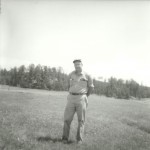
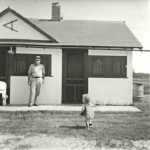 worked. When Uncle Bill finally realized who we were, he was both pleased and stunned. It was such a great prank to pull on him, and he was totally fooled. Then we had a wonderful visit with him afterward. Uncle Bill has always been so special to me, and I missed him a lot. I think we had a lot in common. Our interests run along the same lines, and that made our visits special, and our partings tough. I’m thankful that we still have Uncle Bill in our lives, but I wish we could see him more often. Today is Uncle Bill’s 94th birthday. Happy birthday Uncle Bill!! Have a great day!! We love you!!
worked. When Uncle Bill finally realized who we were, he was both pleased and stunned. It was such a great prank to pull on him, and he was totally fooled. Then we had a wonderful visit with him afterward. Uncle Bill has always been so special to me, and I missed him a lot. I think we had a lot in common. Our interests run along the same lines, and that made our visits special, and our partings tough. I’m thankful that we still have Uncle Bill in our lives, but I wish we could see him more often. Today is Uncle Bill’s 94th birthday. Happy birthday Uncle Bill!! Have a great day!! We love you!!
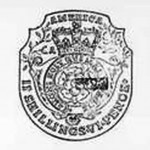 During the years that the colonies were still a part of Great Britain, it was necessary to have troops from Great Britain come and help to defend us during the French and Indian War which took place between 1754 to 1763, and Pontiac’s Rebellion from 1763 to 1764. These were quite costly wars, and to help with recuperate the losses, Great Britain enacted the Sugar Act, which while irritating to the people of the colonies, but it was hidden in the cost of import duties, and so the people accepted it. The enactment of The Stamp Act was a different story, however. The Stamp Act was a tax that Great Britain levied on just the colonies and was strongly disputed. So strongly in fact, that it led to the Revolutionary War.
During the years that the colonies were still a part of Great Britain, it was necessary to have troops from Great Britain come and help to defend us during the French and Indian War which took place between 1754 to 1763, and Pontiac’s Rebellion from 1763 to 1764. These were quite costly wars, and to help with recuperate the losses, Great Britain enacted the Sugar Act, which while irritating to the people of the colonies, but it was hidden in the cost of import duties, and so the people accepted it. The enactment of The Stamp Act was a different story, however. The Stamp Act was a tax that Great Britain levied on just the colonies and was strongly disputed. So strongly in fact, that it led to the Revolutionary War.
The Stamp Act was not what people might think it was. It was not when the use of postage stamps were first introduced. The Stamp Act went so much further than that. The Stamp Act was designed to force colonists to use special stamped paper in the printing of newspapers, pamphlets, almanacs, and playing cards, and to have a stamp embossed on all commercial and legal papers. The stamp itself displayed an image of a Tudor rose framed by the word “America” and the French phrase Honi soit qui mal y pense, meaning ”Shame to him who thinks evil of it.” Of course, the cost of said paper was high, and the colonists ere outraged. This was taxation, without representation, and it was not going to be tolerated.
Massachusetts politician Samuel Adams organized the secret Sons of Liberty organization. They planned protests against the measure, and the Virginia legislature and other colonial assemblies passed resolutions opposing the act. In October, nine colonies sent representatives to New York to attend a Stamp Act Congress, where resolutions of “rights and grievances” were framed and sent to Parliament and King George III. Their voices landed on deaf ears, and The Stamp Act was enacted on this day, November 1, 1765.
The colonists acted quickly. The arrival of the stamps to stamp the paper brought violence and economic retaliation. The colonists began a general boycott of British goods. The Sons of Liberty staged attacks on the customhouses and homes of tax collectors in Boston. The protests and economic turmoil went on for months. Finally, Benjamin Franklin appealed to the British House of Commons. Parliament took a vote, and they repealed The Stamp Act in March 1766. The same day, they made the mistake of passing Declaratory Acts, stating that the British government had free and total legislative power over the colonies.
This would prove to be their downfall. Parliament attempted to force unpopular taxation measures on the American colonies in the late 1760s. This action lead to a steady, and eventually complete, deterioration in British-American relations that brought about the outbreak of the American Revolution in 1775, and the eventual Declaration of Independence of America from Great Britain. It was a hard lesson for Great Britain to 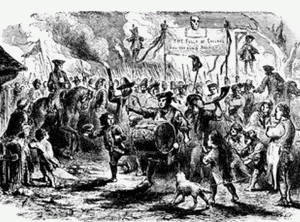 learn, and on that some political parties, namely the Democrats have not learned yet. When you tax the people too heavily, they will rebel, and the outcome will not be in the favor of that abusive government. If taxes are lower, the country will grow. Entrepreneurs will begin new ventures, and the country will prosper, and with prosperity, comes the natural process of more money to run the government. Ours is a nation of independent thinkers, and people of action. Taxes that are too high and unfair, stifle that independent thinking and slow down that action. It is just the opposite of what the proponents of a grossly obese government would expect, but it is nevertheless, the way it works. Our government would do well to realize that, and make a change.
learn, and on that some political parties, namely the Democrats have not learned yet. When you tax the people too heavily, they will rebel, and the outcome will not be in the favor of that abusive government. If taxes are lower, the country will grow. Entrepreneurs will begin new ventures, and the country will prosper, and with prosperity, comes the natural process of more money to run the government. Ours is a nation of independent thinkers, and people of action. Taxes that are too high and unfair, stifle that independent thinking and slow down that action. It is just the opposite of what the proponents of a grossly obese government would expect, but it is nevertheless, the way it works. Our government would do well to realize that, and make a change.
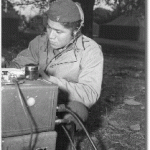 In a war, secrecy is vital. The different sides must take whatever steps necessary to inform their troops and allies of their next step, without revealing the plan to the enemy. In World War II, America and her allies were having trouble with the level of secrecy they were able to achieve. It seemed that no matter what code they used, it was broken almost immediately. It did not help matters that many of the Japanese cryptographers had been educated in the United States. They spoke very good English, and they were very amazingly adept at breaking top secret military codes. For America and her allies, coming up with newer and more complicated codes was becoming more and more difficult, and the Japanese cryptographers seemed to break the new codes almost as quickly as they were developed. They were in real trouble. Then someone remembered a type of code that had been used in World War I, and things began to look up a little for America and the allies. The code was the use of Code Talkers from the Choctaw tribe.
In a war, secrecy is vital. The different sides must take whatever steps necessary to inform their troops and allies of their next step, without revealing the plan to the enemy. In World War II, America and her allies were having trouble with the level of secrecy they were able to achieve. It seemed that no matter what code they used, it was broken almost immediately. It did not help matters that many of the Japanese cryptographers had been educated in the United States. They spoke very good English, and they were very amazingly adept at breaking top secret military codes. For America and her allies, coming up with newer and more complicated codes was becoming more and more difficult, and the Japanese cryptographers seemed to break the new codes almost as quickly as they were developed. They were in real trouble. Then someone remembered a type of code that had been used in World War I, and things began to look up a little for America and the allies. The code was the use of Code Talkers from the Choctaw tribe.
That someone was war analyst Philip Johnston. Phillip, an American who fought in World War I, stationed in France, was too old to fight in World War II, but he wanted to aid in the effort anyway. As a boy, he spent time 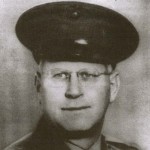 on the Navajo Indian Reservation, where his parents were Protestant missionaries. He learned to speak the Navajo language with his playmates. Suddenly, the idea of a secret military code based on the Navajo language made perfect sense to him.
on the Navajo Indian Reservation, where his parents were Protestant missionaries. He learned to speak the Navajo language with his playmates. Suddenly, the idea of a secret military code based on the Navajo language made perfect sense to him.
In mid-April of 1942, Marine recruiting personnel went to the Navajo Reservation, and presented their plan. They enlisted thirty volunteers from the agency schools at Fort Wingate and Shiprock, New Mexico and Fort Defiance, Arizona. It would be a tall order for these volunteers. Each one had to be fluent in Navajo and English, but they also had to be physically fit, because they would be messengers in a combat zone. They were told that they would be specialists in the United States as well as over seas. Some of them were underage, but birth records on the Reservation were not well kept, so it was easy for volunteers to lie about or just not know their true age, and so they could participate. Carl Gorman, a 36-year-old Navajo from Fort Defiance, was too old to be considered by the Marines, so he lied about his age in order to be accepted.
Because the Navajo language was complicated, and due to the many different dialects, the Japanese could 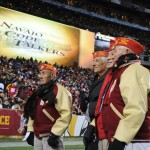 never crack the code. They even captured a Navajo soldier and made him listen to the talk for hours, but because he had not been trained, he was still unable to crack the code. By 1945, there were about 540 Navajos who served in the Marines, and of those 375 to 420 were trained as code talkers. The rest served in other capacities. The code talkers payed an instrumental part in the success of the war effort. On June 4, 2014, Chester Nez, the last living original code talker, passed away. Once, in an interview he said, “My first transmission—one that did not involve coordinates—was one I will always remember: Beh-na-ali-tsosie a-knah-as-donih ah-toh nish-na-jih-goh dah-di-kad ah-deel-tahi, which translates to: Enemy machine gun nest on your right flank. Destroy.” These were great men, and our nation owes them a debt it can never repay.
never crack the code. They even captured a Navajo soldier and made him listen to the talk for hours, but because he had not been trained, he was still unable to crack the code. By 1945, there were about 540 Navajos who served in the Marines, and of those 375 to 420 were trained as code talkers. The rest served in other capacities. The code talkers payed an instrumental part in the success of the war effort. On June 4, 2014, Chester Nez, the last living original code talker, passed away. Once, in an interview he said, “My first transmission—one that did not involve coordinates—was one I will always remember: Beh-na-ali-tsosie a-knah-as-donih ah-toh nish-na-jih-goh dah-di-kad ah-deel-tahi, which translates to: Enemy machine gun nest on your right flank. Destroy.” These were great men, and our nation owes them a debt it can never repay.
 Lately, I have been looking in Ancestry.com, at immigration records for many of my ancestors. As I looked at the different ships they sailed on and the different locations they came from, I began to wonder about what it was really like to immigrate back them. I decided to do some research on that subject, and I was amazed at some of what I found.
Lately, I have been looking in Ancestry.com, at immigration records for many of my ancestors. As I looked at the different ships they sailed on and the different locations they came from, I began to wonder about what it was really like to immigrate back them. I decided to do some research on that subject, and I was amazed at some of what I found.
Of course, the biggest obstacle they faced was the cost…especially for a family. What doesn’t sound like much to us today, was really a lot of money back in the 1800s, and before. My great grandfather, Carl Schuhmacher spent seven years saving the $50.00 that it cost for one person to go. Many times, the whole family would work to send one person over so they could see if the opportunities were really there, and then that person would work t pay for the rest of the family to come.
For people who had to travel in steerage class, the journey was going to be a rough one. There was no limit to the number of steerage tickets sold, and the cost was usually $30.00 per ticket, which tells me that maybe my great grandfather had not traveled in steerage class…which is a relief to me after what I have read. Since there was no limit to the steerage tickets sold, the people were packed into the steerage area like cattle. The cost to feed each one was about sixty cents a day, so they could potentially make a net profit of $45,000 to $60,000 for each crossing. This was money made at the expense of the health, welfare, and even lives of those steerage passengers…a fact that I find shocking to say the least!!
Even when the immigrant wasn’t in steerage, the rough weather often made everyone sick. I don’t think that ships back then had some of the stabilizing features ships have today, and since they were smaller, they were probably tossed around more. Not good if you get sea sick…or even if you normally don’t.
Immigrants were told to be at the docks a day ahead of the departure date, because they had to be examined by American doctors before they were allowed to board the ship. I have no idea where they waited if they didn’t get examined the day before they sailed. I also have to wonder if they had to be examined again when they arrived here, because so many of them were sick on the ship that I would still think they brought disease to America.
Arrival in America didn’t necessarily mean they were set either. Because of language differences and strange sounding names, they were often subject to verbal abuse and discrimination. To fit in they would need to learn 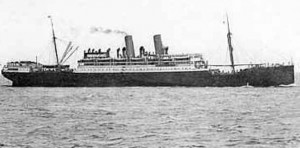 English…something I do agree with, although I don’t agree with discrimination or verbal abuse…or any other kind of abuse. I think they needed someone to teach them, without belittling them. Most wanted to fit in, but didn’t know how to learn English, or simply didn’t have a way to learn it.
English…something I do agree with, although I don’t agree with discrimination or verbal abuse…or any other kind of abuse. I think they needed someone to teach them, without belittling them. Most wanted to fit in, but didn’t know how to learn English, or simply didn’t have a way to learn it.
Any time you make a decision to move to another country, it is a life changing decision, but in those days, it was a much bigger change than it is these days. Had it not been for necessity, due to famine and poverty in their ow country, I have to wonder just how many people would have taken the risk.
 Once a war is over, the people of the world, and especially those who fought in the war never really want to think about it again, but it is, nevertheless, a permanent part of history. It was on this day, January 16, 1991 that America would go to war with Iraq for the first time, and it would be a war that would ultimately draw my brother-in-law, Ron Schulenberg back into the service from the reserves, which is where every soldier is for a time following their active duty term. Ron had joined the Army during a time when things were relatively quiet around the world, and he also ended his active service during a relative time of peace, but all that would change for him when he was notified that he would have to go back to active duty, and to Iraq.
Once a war is over, the people of the world, and especially those who fought in the war never really want to think about it again, but it is, nevertheless, a permanent part of history. It was on this day, January 16, 1991 that America would go to war with Iraq for the first time, and it would be a war that would ultimately draw my brother-in-law, Ron Schulenberg back into the service from the reserves, which is where every soldier is for a time following their active duty term. Ron had joined the Army during a time when things were relatively quiet around the world, and he also ended his active service during a relative time of peace, but all that would change for him when he was notified that he would have to go back to active duty, and to Iraq.
I can only imagine how Ron felt upon receiving that letter. I know how the rest of us felt. We were very concerned for Ron’s safety. None of us wanted him to go, but this was not up to us. The government, and specifically the Army had spoken, and go he would. I remember talking to him about his time over there, years later. One of the things that most civilians wonder about is things like how they felt about killing someone else, or even just seeing a dead body that had been mutilated by the weapons of warfare. For Ron, one of the  strongest memories was marching from one place to another and seeing all the death that was all around them…and then simply stepping over it, like it was a rock or tree stump. In my mind, that would be almost impossible to do, but I suppose that you simply get used to some things…or as much as anyone can get used to war and death.
strongest memories was marching from one place to another and seeing all the death that was all around them…and then simply stepping over it, like it was a rock or tree stump. In my mind, that would be almost impossible to do, but I suppose that you simply get used to some things…or as much as anyone can get used to war and death.
The Persian Gulf War…known as Operation Desert Storm, was a short lived war. Saddam Hussein invaded the little country of Kuwait, because of their oil, making Egypt and Saudi Arabia very nervous, so they called on the United States. When Saddam Hussein refused to leave Kuwait, the war began. The biggest anomaly in Operation Desert Storm, was that the Iraqi soldiers were either not well enough equipped, or simply not willing to die for this cause, and so may of them actually came up to the American troops, and surrendered. I’m sure that the initial fighting, and the amount of war dead lying around the desert, made the decision to surrender seem like the best option. Ron told of this anomaly when we talked about his experiences, and it seemed that it was with a continued sense of relief. I can imagine that the thought of having to kill someone was not one that my brother-in-law relished, but something he would have had to do, had it became necessary.

Ron returned to us from Operation Desert Storm, and his time in the reserves ended. The Persian Gulf area would continue to become more and more unstable, but by the time America would again find herself at war with Iraq and Saddam Hussein, Ron was not required to go. While it is my belief that the second war with Iraq has been far more successful, it has also been filed with far more casualties. I believe that if we had gone in and removed Saddam Hussein during Operation Desert Storm, the world would have been a better place. Would that have prevented the need to go back? I don’t know, but it would have spared many of the lives of the countless people that Saddam Hussein slaughtered during his time in power.
 Many people, myself included, believe that our country was founded and populated in an effort to escape religious persecution. Looking back on several branches of my family tree, as well as that of my husband, I see the personal accounts of a number of people who dealt with persecution first hand. People such as my Aunt Bertha Schumacher Hallgren, who makes not of it in her journals when she speaks of her father, my great grandfather, Carl Schumacher’s return trip to Germany to visit family members who were still living there. During that time, the German government was doing it’s very best to force people to deny the very existence of God on any level, and their lack of any need for a god to lean and rely on. So often, I think of religious persecution, such as we have in the United States today, as being a problem of the current times. I suppose that is because it feel very personal to me at this time in history, but in reality, I suppose it is nothing new. In fact, the Bible says that there is no new thing under the sun.
Many people, myself included, believe that our country was founded and populated in an effort to escape religious persecution. Looking back on several branches of my family tree, as well as that of my husband, I see the personal accounts of a number of people who dealt with persecution first hand. People such as my Aunt Bertha Schumacher Hallgren, who makes not of it in her journals when she speaks of her father, my great grandfather, Carl Schumacher’s return trip to Germany to visit family members who were still living there. During that time, the German government was doing it’s very best to force people to deny the very existence of God on any level, and their lack of any need for a god to lean and rely on. So often, I think of religious persecution, such as we have in the United States today, as being a problem of the current times. I suppose that is because it feel very personal to me at this time in history, but in reality, I suppose it is nothing new. In fact, the Bible says that there is no new thing under the sun.
When my great grandfather made the trip back to his homeland, he had plenty of time. His visit was extended for several months. It was most likely during that time that he became more and more convinced that his move to the United States was the right one for him. While he was free, or at least relatively so, to practice his faith  in his own way, there was, nevertheless, a number of incidences whereby doing so could be frowned upon to say the very least. That fact would not be something that would deter my grandfather from standing on his faith, and it would renew his love for his new country, and his reasons for coming here to it.
in his own way, there was, nevertheless, a number of incidences whereby doing so could be frowned upon to say the very least. That fact would not be something that would deter my grandfather from standing on his faith, and it would renew his love for his new country, and his reasons for coming here to it.
I have run across many other ancestors, particularly on the Knox side of the family who suffered persecution from people in their homeland over their choice of religious beliefs. It’s strange to think that when someone receives a revelation concerning God’s word, that they are immediately looked upon as severely brain damaged. Why is it that people would assume that we humans, with our small minds would somehow have the capacity to know everything God intended for us to know…that there couldn’t possibly be anything else for us to learn from His word. And yet, that is exactly what we do. That is why our forefathers left the old world, and came to America in the first place. The churches they were forced to be a part of, or the removal of any kind of religion from their lives had left them with no choice but to leave the country they have called home all their lives, and move to an unknown world.
I don’t know how many immigrants arrived here as a result of religious persecution, but I do know that our nation has somehow lost sight of why we first began to exist. There are so many religions in the world today…especially Christians and Jews who are bring brutally persecuted right now. I still believe in freedom of religion. I may not agree with some of the religions in the world, but each person should have the right to believe as they choose. And no one should ever have to pay for their beliefs with their lives. I know that this world will probably not change that until Jesus returns, and I think that is very sad.
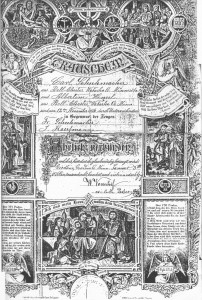 After reconnecting with so many of my Schumacher cousins on Facebook, Ancestry, and now in person, I have begun to wonder more about the Schumacher ancestry even further back. For a number of years, I have been stuck in the 1800’s on the Schumacher side of the family, just hoping for a break, and I think I may now know why. In researching the name Schumacher, I find that Schumacher or Schuhmacher is an occupational surname. It is, of course, the German word for shoemaker. Both spellings can be used as surnames, with Schumacher being the more common one, however, only the variant with an “h” can also be used as a job description in modern German spelling. That fact is of vital importance to my family’s actual history, and it could be the reason I have hit a wall in my search.
After reconnecting with so many of my Schumacher cousins on Facebook, Ancestry, and now in person, I have begun to wonder more about the Schumacher ancestry even further back. For a number of years, I have been stuck in the 1800’s on the Schumacher side of the family, just hoping for a break, and I think I may now know why. In researching the name Schumacher, I find that Schumacher or Schuhmacher is an occupational surname. It is, of course, the German word for shoemaker. Both spellings can be used as surnames, with Schumacher being the more common one, however, only the variant with an “h” can also be used as a job description in modern German spelling. That fact is of vital importance to my family’s actual history, and it could be the reason I have hit a wall in my search.
According to my grandparent’s, Carl and Albertine (Henriette) Hensel Schumacher, marriage certificate, Carl’s last name was actually spelled Schuhmacher…the actual job description, as well as an occupational surname. I had long known of the difference in the spelling, because my Uncle Bill Spencer had sent me a copy of the marriage certificate years ago, but I didn’t know the distinction that one letter held. I didn’t know that it changed the name from just a name to an occupation. If, as I suspect, Carl was encouraged to Americanize the spelling when he came to America, then anyone searching for information on Carl Schuhmacher, would most likely hit a wall…just as I have done. Americanizing surnames was a very common practice in early American immigration history, and sometimes the name the person ended up with was nothing like their real name. It is a serious frustration for the family history researcher.
This now causes me to wonder if our family might be related to such notable people as Eugen Schuhmacher (1906–1973), German zoologist and pioneer of animal documentaries, Irma Heijting-Schuhmacher (born 1925), Dutch freestyle swimmer, or John Schuhmacher (born 1955), American football player. Perhaps our 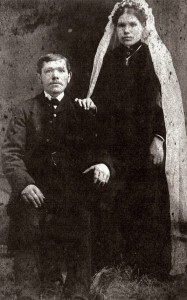 search for our roots should be heading in a completely different direction, because unfortunately, no one told the people in the nation these people immigrated from that they should change their name too, so the lineage would be preserved. Perhaps this spelling of the name will open the doors that have for so long been locked. Only time will tell on this matter, as I delve into the research to see where it will lead me. I hope that it will lead me to the next level…the one after Carl’s dad, my 2nd great grandfather, Johann Schuhmacher, and beyond.
search for our roots should be heading in a completely different direction, because unfortunately, no one told the people in the nation these people immigrated from that they should change their name too, so the lineage would be preserved. Perhaps this spelling of the name will open the doors that have for so long been locked. Only time will tell on this matter, as I delve into the research to see where it will lead me. I hope that it will lead me to the next level…the one after Carl’s dad, my 2nd great grandfather, Johann Schuhmacher, and beyond.
It is so hard for me to hit a brick wall in the family history line, because I want so badly to be able to take each line way back. It has become an obsession I suppose, just like it was for Uncle Bill. Once you get started you don’t want to stop until you reach your goal. Ancestral lines can be hard enough to follow, as the records kept were not as good, or have been lost over the years, but when you add the fact that the names were most likely changed, you find yourself hitting the brick wall that I have hit. Just like the grade school child who spells a totally different word for the teacher, you find yourself realizing the importance of one letter.
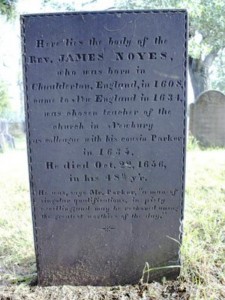 The Noyes side of Bob’s family was a family of prominence. The American side of the family begins with the Reverend William Noyes who was born in England in 1568. While William remained in England all his life, two of his children and a distant cousin left England and immigrated to America, settling in the Massachusetts area. The occupations included ministers of the Gospel, doctors, and commissioned army officers. One interesting fact is that in nearly every generation, there were two siblings who married siblings from another family. I have seen this is many families, including my own, and it makes me wonder if part of the reason is that there were fewer people around with children of suitable age to marry the children of a family. This might have been the case, especially when families began to move out west. In the history of the Noyes family that points out these siblings marrying siblings of another family, I find that Dr James III married Ann Sanford, who was the daughter of Governor Peleg and Mary Sanford, and his brother, Colonel Thomas Noyes married Ann’s sister, Elizabeth Sanford. While this is a bit unusual, it does happen, and there is nothing wrong with it. The fact that it happened about once a generation is a bit more unusual, but I guess it could be that these siblings had similar taste in mates.
The Noyes side of Bob’s family was a family of prominence. The American side of the family begins with the Reverend William Noyes who was born in England in 1568. While William remained in England all his life, two of his children and a distant cousin left England and immigrated to America, settling in the Massachusetts area. The occupations included ministers of the Gospel, doctors, and commissioned army officers. One interesting fact is that in nearly every generation, there were two siblings who married siblings from another family. I have seen this is many families, including my own, and it makes me wonder if part of the reason is that there were fewer people around with children of suitable age to marry the children of a family. This might have been the case, especially when families began to move out west. In the history of the Noyes family that points out these siblings marrying siblings of another family, I find that Dr James III married Ann Sanford, who was the daughter of Governor Peleg and Mary Sanford, and his brother, Colonel Thomas Noyes married Ann’s sister, Elizabeth Sanford. While this is a bit unusual, it does happen, and there is nothing wrong with it. The fact that it happened about once a generation is a bit more unusual, but I guess it could be that these siblings had similar taste in mates.
One of the main reasons that some of the Noyes men moved to American is the same as the reason that many of the first settlers came to America…religious differences with the Church of England. The United States has always been a country that prides itself of personal and religious freedoms. James, who is my husband, Bob’s 7th great grandfather, and who was born in England in 1608, married Sarah Brown, and they immigrated to America, and shortly thereafter, he became one of the founders of Newbury, Massachusetts, where he and his wife settled. He was a minister of the Gospel there for twenty years, and was very well liked in the area. His memory is still precious there to this day.
The Reverend James II, who is my husband, Bob’s 6th great grandfather, and who is the second son of James I and Sarah, followed in the footsteps of his dad, as a minister of the Gospel. His biggest claim to fame is that he bore an active part in the founding of Yale College, and his name was the first of “Ten of the principal ministers in the colony, nominated and agreed upon by general consent both of the ministers and people to stand as Trustees or Undertakers, to found, erect and govern a college.” He was selected to be one of the first trustees and founders of Yale. By this time he was an old man and lived in a remote part of the county, but his influence was considered essential to the undertaking. During his ministry he is noted to have baptized one thousand one hundred and seventy-six persons.
Deacon Noyes, who is the fifth son of Reverend James Noyes II, and Bob’s 5th great grandfather, married Dorothy Stanton, which is part of the 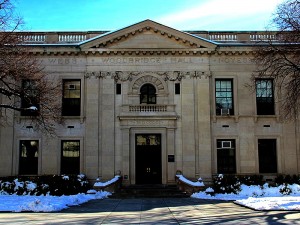 reason I have to wonder in there is a connection between my dad’s half brother’s mother, Edna Stanton, and Bob’s family through Dorothy Stanton. My grandfather, Allen Spencer, and Edna Stanton Spencer had a daughter, who they named Dorothy, and that along with the name Stanton, gives one reason to wonder. I am encouraged a little bit in my search, in that the Noyes family kept good family records. I hope this will be a useful when it comes to a possible connection between the Stantons of the Noyes family, and the Stanton of the Spencer family. Whatever happens, I find that the Noyes family were honorable people of distinction. They were active in their communities, loved and respected, making them a great American family.
reason I have to wonder in there is a connection between my dad’s half brother’s mother, Edna Stanton, and Bob’s family through Dorothy Stanton. My grandfather, Allen Spencer, and Edna Stanton Spencer had a daughter, who they named Dorothy, and that along with the name Stanton, gives one reason to wonder. I am encouraged a little bit in my search, in that the Noyes family kept good family records. I hope this will be a useful when it comes to a possible connection between the Stantons of the Noyes family, and the Stanton of the Spencer family. Whatever happens, I find that the Noyes family were honorable people of distinction. They were active in their communities, loved and respected, making them a great American family.

